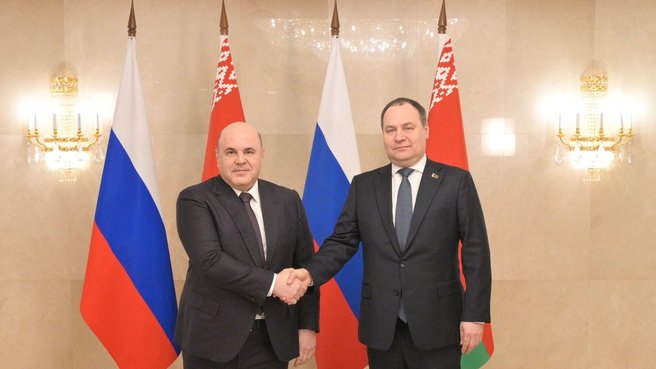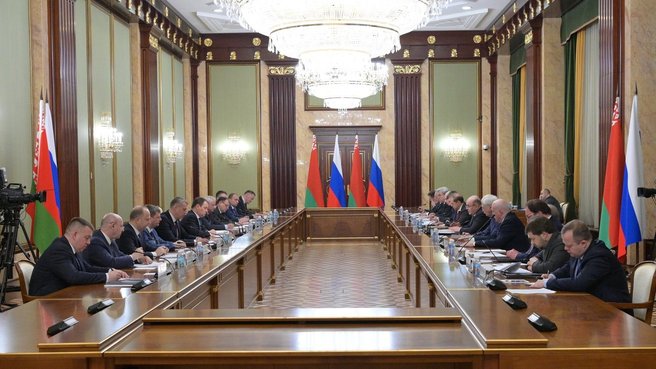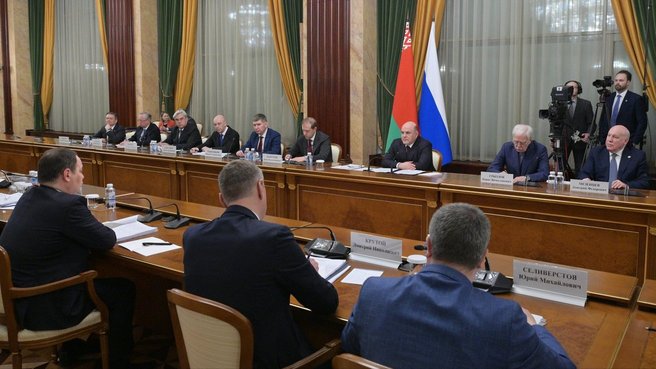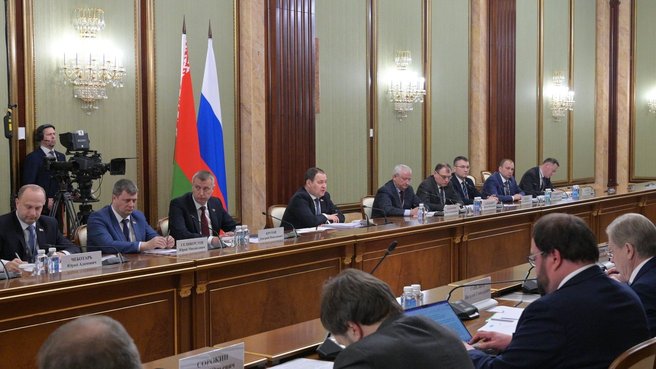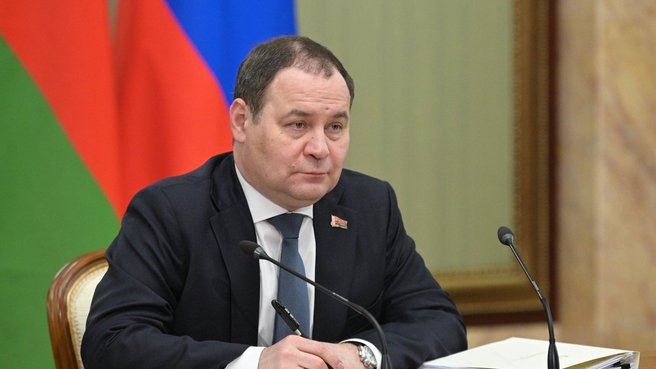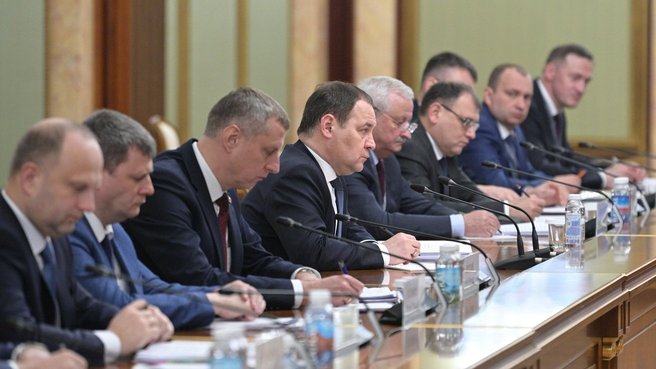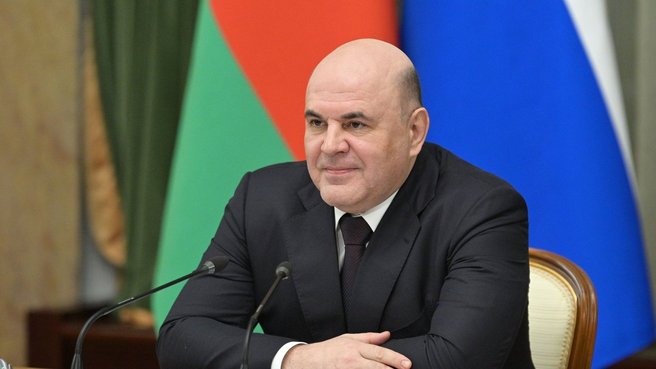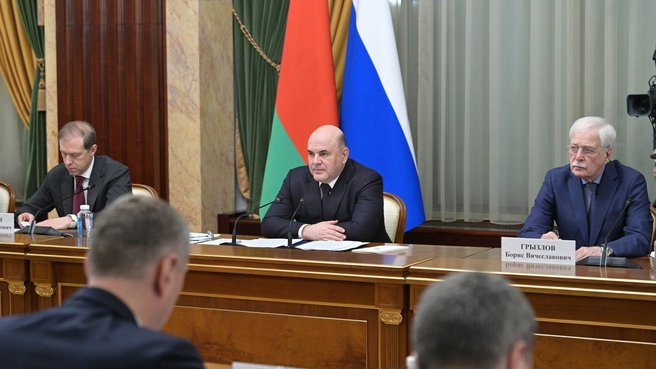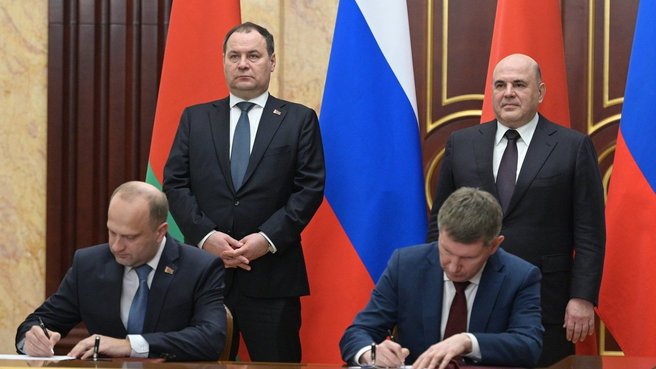Mikhail Mishustin held talks with Prime Minister of the Republic of Belarus Roman Golovchenko.
Mikhail Mishustin and Prime Minister of the Republic of Belarus Roman Golovchenko
Excerpts from the transcript:
Mikhail Mishustin:
Good afternoon, Mr Golovchenko, colleagues.
Your visit couldn’t have come at a better time. Just last week, presidents Vladimir Putin and Alexander Lukashenko held extensive talks in Moscow.
Significant agreements were reached regarding the continued advancement of Russian-Belarusian cooperation and the deepening of integration within the Union State. Naturally, it falls on our governments to ensure the precise and unwavering implementation of all decisions made by our leaders at the highest level.
I would like to extend my heartfelt congratulations on the historic milestone, the inaugural space voyage of Belarusian cosmonaut Marina Vasilevskaya. As you are aware, our presidents have met with members of the 21st expedition to the International Space Station.
I would also loke to highlight that just last week, we witnessed the maiden launch of the super-heavy Angara-A5 rocket from the Vostochny Space Centre. Interestingly, Belarusian builders contributed to the construction of facilities at this launch site.
These accomplishments epitomise the unparalleled level of collaboration between Russia and Belarus in the realm of high technology and science. Beyond manned space missions, our joint efforts extend to space exploration, where we integrate research outcomes into various sectors of our economies, serving the interests of our citizens and the Union State as a whole.
Despite mounting sanctions pressure, Russia and Belarus continue to fortify their union integration. Together, we are implementing the Guidelines for the Implementation of the Treaty on the Union State for the next three years, endorsed by the Supreme State Council on 29 January in St Petersburg, with the participation of our presidents.
Priority focus is placed on bolstering trade and economic cooperation. In 2023, we achieved another record level of mutual trade turnover, totalling 4.2 trillion Russian roubles, or nearly 150 billion Belarusian roubles.
We are expediting the implementation of 25 joint projects in industrial cooperation. Mr Golovchenko, I would like to thank you for initiating industrial cooperation projects in the EAEU and CIS region and, naturally, within the Union State. We are exporting more Belarusian goods to foreign markets using the Russian transport infrastructure. Last year, freight transits soared by over 100 percent on 2022 and reached 20 million tonnes.
Following our talks, we will sign an intergovernmental agreement on the mutual recognition of electronic signatures during trans-border digital interaction. This is a highly important event, and it took us several years to accomplish this objective. We were able to accomplish an entire range of objectives and to resolve complicated legal and technological issues.
From now on, Belarusian and Russian entrepreneurs will be able to take part in state procurement procedures without limitation and to implement other significant legal operations on the Union State’s common goods and services markets.
Today, we will sign another document, an intergovernmental agreement on jointly manufacturing the light-engine multirole aircraft Osvei. The Union State has a large territory, and, of course, we need the most advanced aircraft of various classes and types for carrying passengers and freight. This is why we are launching in-depth cooperation projects in the aerospace sector. The mutually beneficial projects will facilitate the equitable use of technologies and common production facilities.
These decisions have systemic significance for deepening integration inside the Union State. I believe that the citizens of Russia and Belarus are expecting precisely this from us.
Welcome all of you to Moscow once again.
Mr Golovchenko, you have the floor.
Roman Golovchenko: Thank you, Mr Mishustin, colleagues,
Thank you for the opportunity to meet today and discuss topical issues of bilateral cooperation in a traditionally constructive and friendly atmosphere.
Our cooperation agenda is as busy and comprehensive as ever. It is true that recently there have been a lot of meetings at the highest level. Just a few days ago, the President of Belarus concluded another visit to Russia. The two countries’ leaders had extensive talks, following which instructions were issued for our governments.
Let me repeat once again, Mr Mishustin, that we have been working quite successfully both in the domestic and foreign policy, despite all the challenges that Russia and Belarus are facing.
Indeed, our countries have demonstrated significant resilience in these difficult conditions. Both economies have undergone a serious test of strength. As a result, at the end of last year, GDP in both Russia and Belarus grew, and the figure was quite confident: up to four percent. I know that the Russian Federation may still clarify it. Nevertheless, a percent more, a percent less… I would like to congratulate you on this.
Mikhail Mishustin: Better a percent more.
Roman Golovchenko: We have now turned last year’s page and are thinking about this year. The resilience our economies have developed is quite significant, so our governments’ smooth joint work on common challenges is probably our priority.
And, of course, it is quite natural, that trade and economic cooperation is also developing dynamically in these conditions. Last year, mutual trade in goods and services exceeded $53 billion and showed an increase of 6.5 percent.
These positive trends continue this year, too. After two months of this year, we can see that trade grew even compared with the same successful period last year.
I believe you will agree, Mr Mishustin, that we have given a very good boost. Of course, the situation is difficult: new problems arise almost every day, but we address them together. As we have said many times, it is much easier to do this together. This is what the main union integration vector is aimed at.
You are aware that our government agencies have already prepared more than 30 joint action plans to implement the Guidelines of the road map for the construction of the Union State for the next three years. In order to ensure the unconditional implementation of the key agreements between the heads of state, I consider it necessary to speed up the finalisation and adoption of these plans in a single package.
As I have already said, most of these joint plans have already been approved. I think, three or four of them are traditionally difficult, these are mainly energy plans. But I believe that we do not need to divide the package, but issue instructions to finalise these documents in order to accept them; as I have already said, in a single package.
Signed in January of this year, the Union State’s decree on implementing the unified industrial policy has become an extremely important stage in the allied construction effort. In this connection, I would like to orient the related ministries of both countries towards an early joint finalisation of all events needed for the implementation of this decree. The Ministry of Industry and Trade of Russia and the Ministry of Industry of Belarus are working on this.
We are clearly aware of the need to strengthen our countries’ technological sovereignty and to ensure import substitution and a reasonable localisation. President of Russia Vladimir Putin, among others, spoke about the importance of these tasks during his election campaign. Instructions have been issued on building up production capacities, renovating the passenger transport infrastructure, and increasing the manufacture of machine-tools, industrial robots, and so on.
Conscious of how much funds are needed for implementing these instructions, we are ready to join the effort to address these tasks of importance for Russia in the Union State format. After all, Russia will only benefit from this. This means three or four million more workers and engineers. There is no need to spend funds on new capacities; we are ready to share all our skills and use them in tandem.
But we should clearly agree on our common plans. For example, we are producing, already now, a broad range of aircraft components. We are ready to build up capacities on our own in order to increase the output many times over. Let us write this in some programme and define joint duties and commitments in approximately the same way as we did in the draft aircraft development agreement, which will be signed today.
I believe cooperation in implementing the programme on microelectronics is making rapid headway. We are implementing the roadmap to create four new technologies to master 88 products in various sectors.
Belarus is organising the production of metal-to-ceramic packages for integrated microchips. The research and technical centre for the development of crystal production is being established.
But machine tool production does not demonstrate special dynamics although we have signed the cooperation programme. Hence, our countries have to import more machine tools from China. I think we should work harder in such vital areas.
The same applies to agricultural equipment and trucks. We can fully meet the demand of our domestic markets in both positions by concerted efforts. However, the share of Chinese equipment (I mention imports from China but there are others as well) in the Russian truck market increased from 29.5 percent in 2022 to 58.8 percent in 2023. The imports of our classic wheeled agricultural tractors with a 150–250 horsepower capacity went up from 46 percent to 58 percent. In the market of road construction equipment, this figure exceeded 70 percent altogether.
We are seeing and analysing this situation in Russia together with the Ministry of Industry and Trade. We are drafting response measures, in part, the introduction of the recycling fee. However, we understand that we must be careful in this track as well. Some time ago, our Belarusian colleagues suggested a whole package of potential measures in response to these processes in the markets. They were not linked with the recycling fee. For the most part, they concerned mandatory requirements, standardisation, certification, etc. Probably, these measures were not timely during that period. We suggest analysing them again. Probably, this will be timely now.
And, of course, Mr Mishustin, we must continue searching for new mutually beneficial projects, including those on critical imports.
Quite recently, the Republic of Belarus and the Russian Federation adopted a comprehensive programme on cooperation in aircraft construction. Today, we will sign an agreement on organizing the serial production of a two-engine aircraft in the interests of our national security and technological sovereignty. Interestingly, we have found a form whereby Russia and Belarus will invest in this project actually on a parity basis. Hence, they will own together the product that will be developed during the implementation of this important project.
In the last few years, our scientists carried out about 60 joint scientific and technical projects. We maintain intensive cooperation in transport and logistics. We have done much in creating new logistics based on the transport infrastructure of the Russian Federation. We have established patterns for the delivery of products via Russian ports in the northwest. We are also using the routes of the North-South international corridor. As we agreed, we have started preparing to implement a project on the construction of a multi-modal port in the Murmansk Region.
I would like to thank the executives of the Ministry of Transport of the Russian Federation and personally the minister and the Russian Railways for active and constructive cooperation in these areas.
Mr Mishustin, investment cooperation is yet another important area of joint efforts. The Russian Federation is the biggest investor in the economy of our country. The total investments amounted to $5.1billion in 2023, which is one third more than in the previous year. However, in the CIS, The Republic of Belarus ranks only third in investment in the Russian Federation after Kazakhstan and Uzbekistan. I believe the quality characteristics of the investment also leaves much to be desired. The share of the participation of Russian investors in the capital is a mere 2 percent from the total amount of direct investment from Russia. Meanwhile, the share of debt instruments is growing and the share of reinvestment is decreasing in the structure of direct foreign investment.
We hope that a package of measures on encouraging investment activities in the Republic of Belarus and the Russian Federation that we will sign today will facilitate the advent of new Russian investors and the implementation of large mutually beneficial projects.
Incidentally, we suggest substantially increasing the investment channel for implementing infrastructure projects in tourism and health improvement. Belarus is one of the most popular destinations for Russian tourists. Thus, over 1.1 million Russian citizens visited our health resorts and hotels last year. This number could have been much bigger but its growth is limited by the shortage of accommodation. All places in Belarusian health resorts for the latter half of the year have already been booked. Therefore, we are inviting Russian investors to meet this demand.
To reach the goals of our union integration, it is important for us to continue removing the barriers that are still in the way of a free movement of our goods, jobs and services in some places. Therefore, the agreement we will sign today – Mr Mishustin, you mentioned this agreement on recognising an electronic digital signature – will substantially simplify interaction for the economic operators of our countries, especially when they take part in state or municipal tenders.
Mr Mishustin, we are ready to discuss in detail all areas of mutual interest. I believe that our today’s meeting will allow us, as always, to find mutually acceptable and mutually beneficial solutions for our further work in the interests of our states and peoples.
Thank you.
Mikhail Mishustin: The only thing I would like to respond to, Mr Golovchenko, is about investments from Russia. Of course, I know that a huge number of Russian industrialists and entrepreneurs are ready to invest, but it is important that the debt is repaid in order to place new Belarusian bonds on the Russian financial market. This is what we are talking about. I think this is the limiting factor. I know that the Government of Belarus is going to make a number of decisions. I am absolutely sure that this will be an important factor, together with the agreements that we will sign today, that will encourage the investment process, including in the Belarusian economy.
